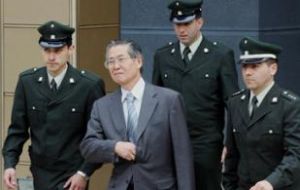MercoPress. South Atlantic News Agency
Fujimori under house arrest pending extradition ruling
 Fujimori says he will make no attempt to flee Chile pending the outcome of his extradition case
Fujimori says he will make no attempt to flee Chile pending the outcome of his extradition case A Chilean judge placed former Peruvian president Alberto Fujimori under house arrest Friday ahead of a Supreme Court ruling on his extradition to Peru, the court said.
The order was requested earlier Friday by Lima government lawyers a day after Chile's Supreme Court prosecutor recommended that Fujimori be extradited to Peru to face charges of abuse of power during his 1990-2000 presidencies. The Peru lawyers cited the "gravity" of the accusations against him, altogether 10 charges for corruption and two for violating human rights, which prosecutor Monica Maldonado called "devastating." The most serious charges allege his culpability in the 1992 massacre by government forces of nine students at Cantuta University, and the 1991 killing of 15 people in a neighborhood of Lima, blamed on a military death squad. Fujimori "is now under house arrest," said judge Urbano Marin, adding that the former president was staying, under police custody, at an apartment in the residential Chicureo district north of the city. Fujimori was moved there from his home in central Santiago, near the Japanese Embassy. Authorities cited "safety and comfort reasons" for the move, but reportedly have feared that Fujimori might flee into the Japanese embassy for protection. In an interview in El Mercurio daily Friday, Fujimori said he was at peace as he awaited the Supreme Court's decision following prosecutor Maldonado's non-binding recommendation. "I am calm and serene, taking the report with prudence and serenity," he said. "I don't want to make predictions about court proceedings, but I don't see it as a loss." In Lima, Peruvian lawmaker and Fujimori follower Carlos Raffo called the house arrest order "excessive," and said Fujimori's lawyers would appeal the move. Fujimori has been free to move about inside Chile since May 2006, but is not allowed to leave the country while Lima's extradition request is processed. Orlando Alvarez, the Supreme Court judge handling the Fujimori case, has no time limit for his extradition decision, which will probably be appealed by either Fujimori or the Peruvian government, setting in motion a long legal process involving five Supreme Court appellate judges. Observers expected the extradition ruling to take several weeks, noting that judge Alvarez had taken sick leave, leaving Marin in charge of the Fujimori case.




Top Comments
Disclaimer & comment rulesCommenting for this story is now closed.
If you have a Facebook account, become a fan and comment on our Facebook Page!